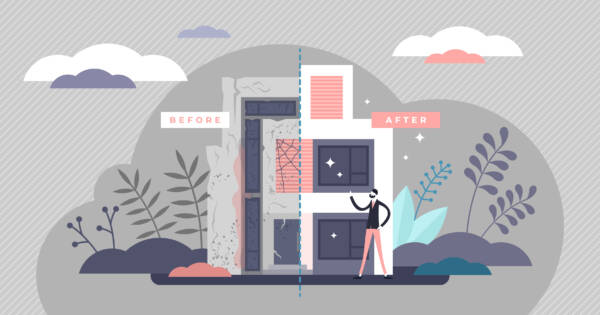If you’ve ever borrowed money to buy a home (aka obtained a mortgage), you’re probably familiar with home appraisals. Most lenders will require an official home appraisal before they fork over the money. They just need the approval of a professional that the house is worth as much as you’re trying to pay for it. A home appraisal is really the only way they can verify that the house will be suitable collateral if you stop paying your mortgage for some reason. Unfortunately, you probably can’t pick who the lender sends to do the appraisal — even though you’ll almost certainly be footing the entire bill for it. The good news, though, is that there are some steps you can take to make sure your home appraisal comes back the way you want it. Let’s go over them.
Who Needs An Appraisal?
Before we talk about the contents of a home appraisal, let’s take a minute to discuss why you need an appraisal. We already mentioned that you might need to get an appraisal in order to qualify for a mortgage. So obviously an appraisal is important whenever you are buying a house. But what about if you’re the one selling?
If you’re selling your house, a home appraisal is still a good idea. This is especially true if you’ve been living there for a while and don’t have an accurate idea of what homes in your neighborhood are worth. You should know, however, that appraisals almost always home in below market value. An appraiser may give you home a value of $350,000, for example, but that doesn’t mean it won’t sell for more.
Watch For Mistakes
The most important part of any appraisal is that it’s accurate. You should always ask for a copy of an appraisal, regardless of whether you’re the one buying or the one selling. An innocent error could make a big difference in the final value listed. So double-check that everything is accurate, since it could have a huge impact on the price of the house or the terms of your mortgage.
Make sure the address is right. Make sure the details of the house are correct. (Is it two bedrooms? Three bedrooms? Is there a garage?) Basically, you want to go over the entire document for any obvious (or not-so-obvious) mistakes. If you do find an error, you should contact the appraiser and ask them to correct or clarify it.
What Should Be Reviewed?
What do you need to review in the home appraisal? The long answer is “everything.” After all, home appraisals are submitted by humans. And humans make mistakes all the time. It’s nothing personal, of course. We all do it. But buying a home is hardly a small purchase, so you shouldn’t feel bad about reviewing someone else’s work. It’s your money on the line, after all.
I’ve bought a few houses in my lifetime, but I’m not exactly a seasoned veteran. I’ve haven’t been through that many appraisals in my lifetime, but I’ve still caught several mistakes already. One time, the appraiser even got the address wrong. There are a few key areas you should pay particular attention to.
The Market Value Is Key
During the buying process, this is (by far) the most important number to verify. On the one hand, you want to make sure you aren’t overpaying for the property. On the other, lenders will want to make sure there’s enough equity on the home so they’ll cover themselves in case you default on the loan.
If you are selling a home, a low appraisal may prompt the buyer to come back to the negotiate a lower price. That’s why this number is key. In hot real estate markets, though, the appraisal may not matter as much. Eager buyers are happily bidding well over the asking price in many places these days.
Square Footage is Important
If the market value seems off, the first thing you should do is look at the stated square footage. Home appraisers are supposed to measure indoor and outdoor space. That means every room, every living space, and even the backyard. In reality, not everyone is going to be this thorough. Many appraisers think they can accurately “eyeball” these numbers. Or they will simply use previously listed numbers, without verifying for themselves.
You should pay special attention to the square footage. If the appraisal states a significant difference from the tax records or property listing, then the entire estimated market value could be wrong too.
The number of bedrooms, bathrooms, or garage spaces should also be correct. Like I said, though, mistakes do happen. You probably want someone to confirm these numbers with the appraiser when they’re at the site, if possible. Ultimately, just make sure the report shows the right number of rooms, spaces, and square footage. You don’t want any official documents that show discrepancies.
Carefully Read The One Unit Housing Trends
There’s a good chance that your appraiser will use the Uniform Residential Appraisal Report (URAR form) from Fannie Mae — especially if you’re getting an appraisal because you needs a mortgage. It’s a pretty standard report. One of the most important sections is called the One Unit Housing Trends. You want to pay special attention to this section. This is where the appraiser would indicate market demand. That includes how long the property has been sitting on the market, supply and demand, and whether property values are increasing or decreasing in the area.
The reason this section is so important is that any errors here could suggest the appraiser doesn’t understand the market that the house is in. That could mean any adjustments or comparable sales (used to report the final value of the property) could also be incorrect.
The Comparable Sales Selection Is Crucial
No two homes are alike. That’s why some listings sell for much more than others — even in the same area. That makes an appraiser’s job very difficult. Then again, it’s why are paid hundreds of dollars per appraisal. So don’t let them off the hook. If you ever want to challenge an appraisal, this is the first section you should go to (after making sure there aren’t any clerical errors, of course).
Here are some common things to consider when it comes to comparable sales.
- Did the house recently have a major renovation that makes it more expensive than comparable sales? Like a new kitchen, for example?
- Does the house have any special features, like a deck or a pool?
- Does the house have any notable upgrades, like a brand new air conditioner, roof, or solar panels?
You should also check if the opposite it true. That is, if comparable sales did include those things but the house you need an appraisal on does not. Try to make sure you’re comparing apples to apples. Make sure your appraiser does too. Otherwise, your estimated property value could change dramatically.
Look at the Adjustments
Did the appraiser notice any of the improvements done to the house? If everything is listed, then make sure all the adjustments make sense as well. Remember that any adjustments should be based on how much a buyer would pay for the upgrade, not how much it cost. For example, the remodeled kitchen may have cost you $15,000 in materials and labor. However, maybe you live in a neighborhood where brand new kitchens regularly add $50,000 to the sale price of a home.
In this example, you want to make the adjustment reflects the new value of the home — not just the original upgrade cost. It’s a bit tricky, though. It requires some extra research into the details of the upgrade itself, and how other homes with comparable kitchens have sold. Still, the effort may be worth it if the difference helps you qualify for the loan (or get more money for the home you’re selling).
Home Appraisals Are Supposed to be Objective, But…
You may already know this, but home appraisals are more like an art than an exact science. They are done by humans, with their own opinions and biases. Some appraisers are incredibly organized, consistent, and detailed oriented. Others are downright sloppy. And since you don’t normally get to pick the appraiser yourself, it can be a crapshoot.
So it pays to offer the appraiser a little bit of help. You should try to be there when the appraiser comes to your home (or the home you’re hoping to buy). You will likely be more familiar with the property, either because you’ve been living in it or are hoping to buy it. While you don’t have to wine and dine the appraiser or lay on the charm too thick, you can still make a point to highlight the important things. Mention any upgrades, additions, renovations, or new appliances that might add value. The appraiser may even appreciate your help.
You May Not Even Need a Home Appraisal to Being With
If you’re overwhelmed by the whole home appraisal process, you’ll be glad to know that some lenders may be willing to waive the requirement in a mortgage application. However, this is more common in refinances. There’s usually more obvious equity in a refinance situation, making the bank more confident in lending. Overall, lenders may be okay with skipping the appraisal if your loan-to-value ratio is very low.
Think about it. At the end of the day, lenders just want to make sure they can recoup their money if you default on the loan. Let’s say that most properties in your neighborhood are worth $1 million dollars or so. Even if your property is in rough shape, you can likely still sell it for at least $800,000, based on location alone. If you are only trying to qualify for a $300,000 loan, you would never walk away from the house entirely if times got tough. You have too much equity. Instead, you would probably be forced to sell place. That would pay off your loan and still leave you with at least $500,000 to fund your next home purchase.
Lenders Don’t Want To Be Underwater
This is what the lender prefers. The mortgage provider is in the business to make money, which they primarily do with customers who pay on time. They aren’t looking to repossess homes and sell them at auction, in a last ditch effort to recoup their losses. They only do that because it’s sometimes necessary, but it’s certainly not their business model.
When a lender is willing to waive the home appraisal requirement for your mortgage application, you don’t need to take it as a bad sign. For starters, you won’t have to pay for it. That’s a saving of between $300 and $600, depending on your area. I’ve even seen appraisals cross the $1,000 mark for some larger, more expensive properties. If you have solid credit, a decent down payment, and enough proof of income that the lender knows you can make the payments, you may be able to ask them to waive the appraisal requirement.
The Bottom Line
A home appraisal report can seem complex. The URAR form from Fannie Mae, for example, is six pages long (with very small font). Still, it’s not that difficult to understand once you get past the fear of not knowing all the jargon. Don’t be afraid to read it, re-read it, ask a friend, or Google anything that you’re not sure about.
When you get the report, look through it carefully. Make sure all the details are correct and make sense. Then go back and look at all the check boxes and the comparable sales information. Of course, check the estimated market value of the property. If everything seems right, then congratulations — you’ve taken one big step toward a successful refinance or mortgage approval.
 Shutterstock
Shutterstock







